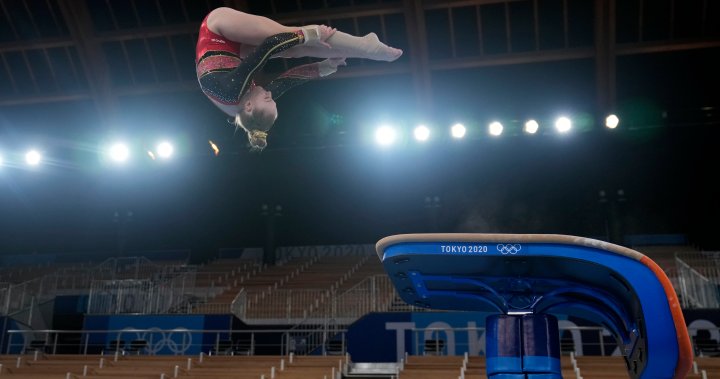After being postponed for a year due to COVID-19, athletes gathered from across the globe to compete for gold medals in the 2020 Tokyo Olympics. Across the host country, familiar motions took place. Gymnasts flipped and raised their arms. Soccer players masterfully dribbled balls up and down fields. Dressage horses performed piaffes and pirouettes.
But one unignorable difference remained. Athletes are running, kicking, spinning and swimming to the tune of fanless silence this year, a sombre reminder of the COVID-19 pandemic that rages on in Tokyo and much of the world.
Only at a few far-flung events — like soccer matches in the northern prefecture of Miyagi — have fans been allowed to enter. Even then, capacities are severely limited.
Read more:
With less than 1 week until the Tokyo Olympics, here’s what to expect
Both teams line up before the men’s volleyball preliminary round pool A match between Italy and Canada at the 2020 Summer Olympics, July 24, 2021, in Tokyo, Japan.
(AP Photo/Frank Augstein)
Rachel Honderich (front) and Kristen Tsai of Team Canada compete against Mayu Matsumoto and Wakana Nagahara of Team Japan during a Women’s Doubles Group B match on day two of the Tokyo 2020 Olympic Games at Musashino Forest Sport Plaza on July 25, 2021 in Chofu, Tokyo, Japan.
(Photo by Lintao Zhang/Getty Images)
Asia D’Amato, of Italy, performs her floor exercise during the women’s artistic gymnastic qualifications at the 2020 Summer Olympics, July 25, 2021, in Tokyo.
(AP Photo/Natacha Pisarenko)
Julia Sude and Karla Borger, of Germany, play against Anouk Verge-Depre and Joana Heidrich, of Switzerland, during a women’s beach volleyball match in the empty Shiokaze Park at the 2020 Summer Olympics, Saturday, July 24, 2021, in Tokyo, Japan.
(AP Photo/Felipe Dana)
Just two days before the Games began, the Japanese capital reported 1,832 new cases of the virus, rapidly rising to a six-month high.
Tokyo 2020 officials banned spectators from all sporting events, stadiums and Olympic venues on July 8 after a sudden surge in cases of the highly infectious Delta variant forced Japan to declare a public health emergency.
The Olympic village is far from empty, though. Around 11,500 athletes are expected in Japan to compete, while another estimated 79,000 journalists, officials and staff are also expected to be in attendance.
As of Sunday, 79 people connected to the Tokyo Olympics had tested positive for COVID-19.
Shallon Olsen of Team Canada competes on balance beam during Women’s Qualification on day two of the Tokyo 2020 Olympic Games at Ariake Gymnastics Centre on July 25, 2021 in Tokyo, Japan.
(Photo by Jamie Squire/Getty Images)
Japan’s Maya Yoshida, left, takes a penalty kick against South Africa as the stands sit empty during a men’s soccer match at the 2020 Summer Olympics, July 22, 2021, in Tokyo, Japan.
(AP Photo/Shuji Kajiyama)
Lin Chen-hao, center right, of Taiwan, and Shira Rishony, of Israel, compete in a women’s 48-kg match with no spectators attending at the 2020 Summer Olympics, July 24, 2021, in Tokyo.
(AP Photo/Jae C. Hong)
Felix Auger-Aliassime, of Canada, plays against Max Purcell, of Australia, during the first round of the tennis competition at the 2020 Summer Olympics, July 25, 2021, in Tokyo, Japan.
(AP Photo/Seth Wenig)
Australia’s Kaia Parnaby pitches during the softball game between the Italy and Australia at the 2020 Summer Olympics, July 22, 2021, in Fukushima, Japan.
(AP Photo/Jae C. Hong)
Athletes from around the world, including Canada, took part in the opening ceremony for the Tokyo Olympics. The 2020 games, which will run until Aug. 8. will see a total of 370 athletes from Canada, the nation’s largest delegation since 1984.
Marco Balich, longtime opening ceremonies executive producer and now a senior advisor to the Tokyo ceremonies executive producer, told Reuters the event was scaled down to offer a “sobering” performance.
“We have to do our best to complete this unique and hopefully the only one of its kind Olympics,” he said.
“It will be a much more sobering ceremony. Nevertheless with beautiful Japanese aesthetics. Very Japanese but also in sync with the sentiment of today, the reality.”
Arianna Errigo of Team Italy, right, competes against Jessica Zi Jia Guo of Team Canada in Women’s Individual Foil third round on day two of the Tokyo 2020 Olympic Games at Makuhari Messe Hall on July 25, 2021 in Chiba, Japan.
(Photo by Matthias Hangst/Getty Images)
The United States plays Romania during a women’s 3-on-3 basketball game at the 2020 Summer Olympics, July 25, 2021, in Tokyo, Japan.
(AP Photo/Jeff Roberson)
Stands remain empty of fans due to COVID-19 restrictions on the north pitch of the Oi Hockey Stadium during a women’s field hockey match between China and Japan at the 2020 Summer Olympics, July 25, 2021, in Tokyo, Japan.
(AP Photo/John Minchillo)
Players of Brazil and Ivory Coast warm up in the International Stadium prior to a men’s soccer match at the 2020 Summer Olympics, July 25, 2021, in Yokohama, Japan.
(AP Photo/Kiichiro Sato)
— with files from the Associated Press and Reuters
© 2021 Global News, a division of Corus Entertainment Inc.














































